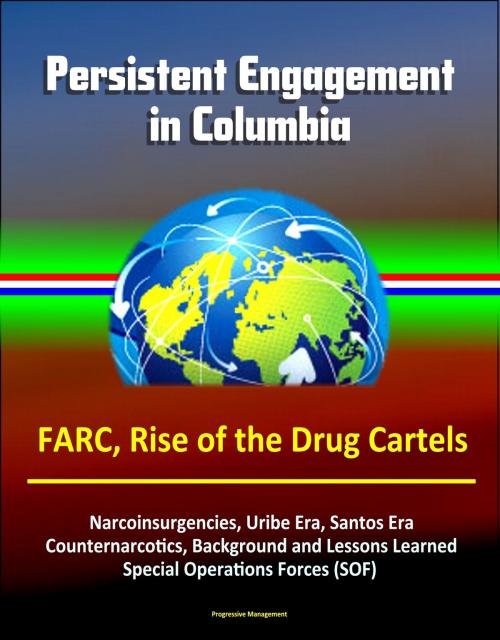Persistent Engagement in Columbia - FARC, Rise of the Drug Cartels, Narcoinsurgencies, Uribe Era, Santos Era, Counternarcotics, Background and Lessons Learned, Special Operations Forces (SOF)
Nonfiction, History, Americas, South America, Military| Author: | Progressive Management | ISBN: | 9781311066848 |
| Publisher: | Progressive Management | Publication: | January 27, 2016 |
| Imprint: | Smashwords Edition | Language: | English |
| Author: | Progressive Management |
| ISBN: | 9781311066848 |
| Publisher: | Progressive Management |
| Publication: | January 27, 2016 |
| Imprint: | Smashwords Edition |
| Language: | English |
Professionally converted for accurate flowing-text e-book format reproduction, this monograph analyzes United States Special Operations Forces' (USSOF) assistance to Colombia in the context of decades of counterinsurgency and counternarcotics operations. While the case of Colombia is often cited as an exemplar of global Special Operations Forces (SOF) foreign engagement, the details of the engagement, and the reasons for its success, have not previously been addressed in a scholarly publication. This study represents the first comprehensive analysis of the persistent SOF engagement in Colombia. It draws upon the collective wisdom of numerous U.S. and Colombian government personnel, and the authors' own decades of experience in Colombia and other countries where the United States has undertaken prolonged partnership.
The authors attribute the success of SOF engagement in Colombia to the long-term development of human capital in the Colombian security forces. As trainers, educators, and advisors, U.S. special operators helped nurture Colombian officers and NCOs who would rise through the ranks into key positions of leadership. The huge improvements in Colombian counterinsurgency and counternarcotics performance were the result, first and foremost, of dedicated and skilled Colombian leaders.
After chronicling the history of SOF engagement and Colombia's security environment, the authors provide lengthy lists of lessons learned and recommendations. They emphasize the need to be selective in engagement, and identify critical criteria for choosing partners, such as leadership, institutional missions, operational requirements, and human rights records. They advocate long-term and persistent engagement, with special emphasis on training and education. In their estimation, SOF should seek to confer advanced skills to the greatest extent possible, which is a matter of special relevance today as the U.S. government contemplates how to use SOF in capacity building going forward. Because the Colombian security forces have made great advances at lower organizational levels, the authors provide advice on how SOF can and should contribute to development at higher levels. In addition, the authors draw upon the experiences of Colombia's counterinsurgency and counternarcotics campaigns to make recommendations for future strategy and tactics.
As North Atlantic Treaty Organization participation in Afghanistan draws down and policymakers seek to bolster partnerships around the world, USSOF are increasingly deployed to assist foreign security forces. This monograph provides insights that should be valuable to any special operators involved in capacity-building endeavors. It also demonstrates once more the value of SOF in advancing U.S. security objectives through a global SOF network.
Professionally converted for accurate flowing-text e-book format reproduction, this monograph analyzes United States Special Operations Forces' (USSOF) assistance to Colombia in the context of decades of counterinsurgency and counternarcotics operations. While the case of Colombia is often cited as an exemplar of global Special Operations Forces (SOF) foreign engagement, the details of the engagement, and the reasons for its success, have not previously been addressed in a scholarly publication. This study represents the first comprehensive analysis of the persistent SOF engagement in Colombia. It draws upon the collective wisdom of numerous U.S. and Colombian government personnel, and the authors' own decades of experience in Colombia and other countries where the United States has undertaken prolonged partnership.
The authors attribute the success of SOF engagement in Colombia to the long-term development of human capital in the Colombian security forces. As trainers, educators, and advisors, U.S. special operators helped nurture Colombian officers and NCOs who would rise through the ranks into key positions of leadership. The huge improvements in Colombian counterinsurgency and counternarcotics performance were the result, first and foremost, of dedicated and skilled Colombian leaders.
After chronicling the history of SOF engagement and Colombia's security environment, the authors provide lengthy lists of lessons learned and recommendations. They emphasize the need to be selective in engagement, and identify critical criteria for choosing partners, such as leadership, institutional missions, operational requirements, and human rights records. They advocate long-term and persistent engagement, with special emphasis on training and education. In their estimation, SOF should seek to confer advanced skills to the greatest extent possible, which is a matter of special relevance today as the U.S. government contemplates how to use SOF in capacity building going forward. Because the Colombian security forces have made great advances at lower organizational levels, the authors provide advice on how SOF can and should contribute to development at higher levels. In addition, the authors draw upon the experiences of Colombia's counterinsurgency and counternarcotics campaigns to make recommendations for future strategy and tactics.
As North Atlantic Treaty Organization participation in Afghanistan draws down and policymakers seek to bolster partnerships around the world, USSOF are increasingly deployed to assist foreign security forces. This monograph provides insights that should be valuable to any special operators involved in capacity-building endeavors. It also demonstrates once more the value of SOF in advancing U.S. security objectives through a global SOF network.















